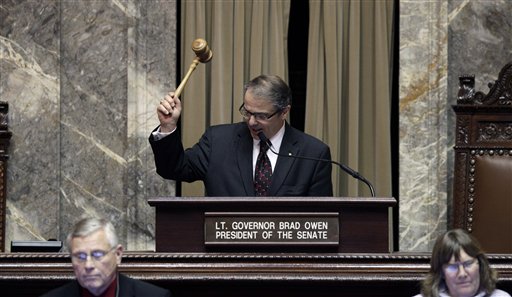By Rachel La Corte
The Associated Press
OLYMPIA — The Washington state Legislature adjourned a double overtime session early today after finalizing a budget deal that had lawmakers working throughout the night and into the morning.
The legislative session ended shortly after the Senate passed a budget measure on a 44-2 bipartisan vote and sent the bill to the governor for her signature. The House earlier passed the negotiated agreement on a 64-34 vote.
Lawmakers also passed several bills before taking up the budget.
The flurry of activity over the past two days was the culmination of months of negotiations over how to close a roughly half-billion dollar shortfall for the two-year budget cycle ending June 2013.
Sen. Ed Murray, Senate Democrats’ lead budget writer, lauded the fact that lawmakers didn’t make cuts to K-12 or higher education, as they have in past budgets.
“That’s key,” he said following the vote.
Sen. Joe Zarelli, Senate Republicans’ lead on budget issues, said that the ultimate budget was “accomplished in a bipartisan way, sometimes tugging and pulling, but nonetheless, in a bipartisan way.”
“It’s been a pretty significant experience and we’re better for it,” he said.
Gov. Chris Gregoire had called lawmakers back into a second special session at midnight Tuesday after they failed to complete their work by the end of the first 30-day special session.
The budget plan relies heavily on an accounting maneuver, valued at $238 million, in which the state would temporarily claim control of local sales taxes before they are redistributed back to jurisdictions at their usual time — roughly a month after they are collected. Some social safety net programs that were at risk of being cut were preserved.
The budget increases taxes, raising $14.5 million by eliminating a tax deduction for some large banks. It also brings in some $12 million by changing rules on roll-your-own cigarettes.
Lawmakers plan to leave some $320 million in reserves.
“The biggest obstacle always is, can you get consensus? This was not an easy process,” said Rep. Ross Hunter, D-Medina. He said that the challenge was trying to reach a deal that ensured at least 50 votes in the House and 25 in the Senate that still “met some sort of basic levels of financial responsibility.”
“I think we accomplished that,” he said.
Reform bills that had been a key part of negotiations have either been passed out of the entire Legislature, or at least one chamber.
Even though any special session can run up to 30 days, Gregoire said early today that lawmakers agreed to a one-day session. Lawmakers had been passing bills tied to the budget right up until the deadline, but weren’t able to move everything before time ran out.
Lawmakers had announced Tuesday that they reached a tentative deal, and started moving bills. However, at various points, action came to a halt as negotiators worked out details on bills still in question.
Gregoire said a key sticking point was over a bill to alter health insurance benefits for K-12 employees, but ultimately a compromise helped both chambers pass the measure.
Part of the agreement was tied to a bill addressing early retirement benefits for future state employees. That measure had been a key sticking point between Democrats and Republicans.
A Republican-led coalition in the Senate had insisted on several reform-related bills, including the pension one, before taking up the budget. Senators approved the pension bill Tuesday by a margin of 27-22. It later passed the House, finalizing a deal that eluded lawmakers for months and delayed final action on the state budget.
State workers who retire before the age of 62 already have scaled back pension benefits. Under the new bill, pension benefits for workers retiring at the age of 55 would be reduced by as much as 50 percent. The changes only apply to workers hired starting in May 2013. The plan would save the state an estimated $1.3 billion over 25 years.
Also Tuesday, the House passed a measure that would require the state’s two-year budget to be in line with anticipated revenue over a four-year period or 4.5 percent growth per year, whichever is greater. The measure, another bill that was part of the budget negotiations, was passed by the Senate and headed to Gregoire’s desk.
Lawmakers also approved a $1 billion capital budget package that supporters say will lead to 18,000 construction jobs.

